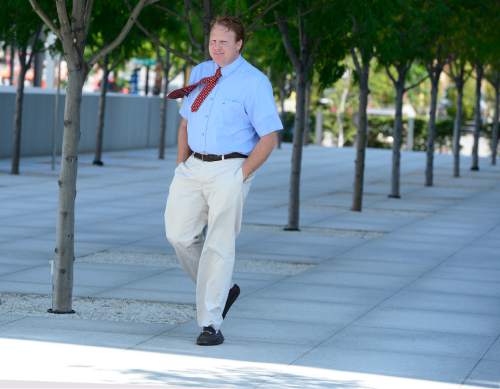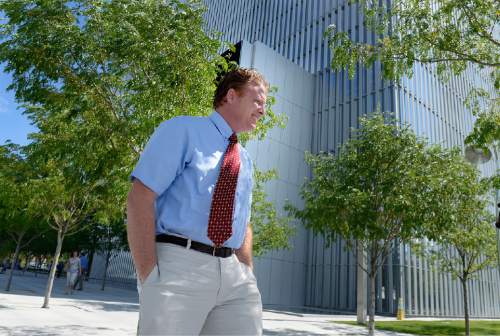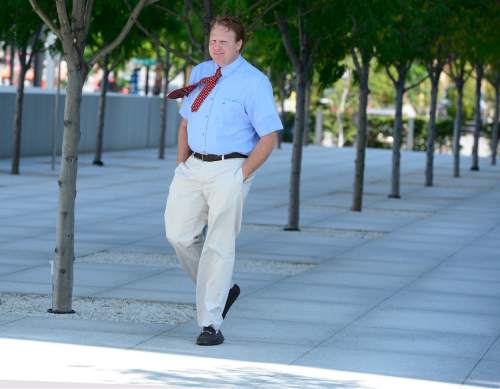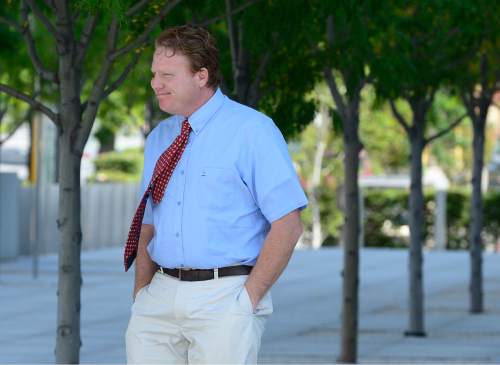This is an archived article that was published on sltrib.com in 2015, and information in the article may be outdated. It is provided only for personal research purposes and may not be reprinted.
Jeremy Johnson withdrew his request Wednesday that he be allowed to act as his own lawyer, and a federal magistrate appointed a new set of attorneys to represent the St. George businessman against dozens of criminal charges related to operation of his online marketing company.
U.S. Magistrate Judge Paul Warner named veteran defense attorneys Greg Skordas and his wife, Rebecca Skordas, to represent Johnson, who, along with four other I Works employees, faces 86 charges focused mostly on alleged bank fraud.
The Skordases replace attorneys Ron Yengich and Chelsea Koch, who developed an unspecified conflict of interest when the Federal Election Commission recently sued Johnson over allegations he made illegal campaign donations several years ago.
The Skordases are the third set of attorneys for Johnson in the Salt Lake City criminal case. Attorney Nathan Crane withdrew earlier, also for unspecified reasons, though Johnson claimed in a court document that the government had run off Crane, Yengich and Koch.
Rebecca Skordas had been representing former I Works employee Scott Muir, who is a possible prosecution witness. Muir, who sat next to Johnson's wife, uncle and aunt during most of the Wednesday proceedings, agreed to change lawyers so Skordas would not have a conflict of interest in representing Johnson.
Warner told Johnson that he had gone out of his way to choose competent attorneys for him and urged him to cooperate with the Skordas team.
"I made every effort to find experienced, first-rate counsel," Warner said, adding he would change attorneys again only if "something very unusual" occurred.
"We're going to finish this thing off," Warner said.
A trial, originally scheduled to begin Sept. 14, would likely now be about six months away to give Johnson's new lawyers time to wade through the evidence and file motions, the judge said.
There was no discussion Wednesday, nor at a hearing last week, about Johnson's contention that the government had been inappropriately monitoring communications with his attorneys for several years and had provided emails to other defendants' lawyers.
The U.S. attorney's office for Utah has declined comment on the allegations of intercepted communications.
Also on Wednesday, Assistant U.S. Attorney Robert Lunnen, the lead prosecutor in the case, said the government was preparing a new indictment that would eliminate parts of the current one.
Lunnen has said that the intended changes would remove language connected to the Federal Trade Commission lawsuit, which has been pending in Nevada since December 2010. That suit alleges Johnson, I Works and employees used deceptive Web pages to defraud consumers.
Some money-laundering charges might also be dismissed, he said, and the new indictment would zero in on bank-fraud allegations.
At a previous hearing, Lunnen said the government concedes banks did not lose money in their dealings with I Works, so "we're talking about intended loss." Under a 10th U.S. Circuit Court of Appeals decision, intended loss "means a loss the defendant purposely sought to inflict."
The current indictment alleges Johnson and others set up a series of "shell companies" to help process consumer credit and debit cards and defrauded banks because the applications for accounts misstated the companies' ownership and other information. Johnson previously has said that banks or their agents advised him on how to set up the companies to reduce fraud that some affiliate companies were engaged in and that the banks or their agents did not lose any money.
Johnson is a central figure in the criminal corruption cases pending in state court against former Utah Attorneys General John Swallow and Mark Shurtleff.













